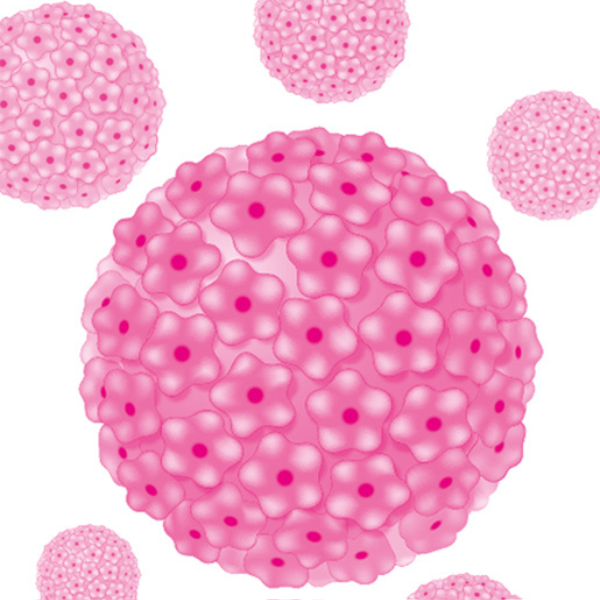About HPV
Last modified: 5 June 2025, 09:12
What is HPV?
Human papillomavirus (HPV) is the name of a common virus. It infects the skin and any moist membrane (mucosa). This includes the:
- cervix
- vagina
- vulva (the skin of the lips surrounding the vagina and the clitoris)
- anus or ‘back passage’
- lining of your mouth and throat.
Most people will get HPV at some point in their lives and it usually goes away without causing any problems.
Is it easy to get HPV?
Because HPV lives on our skin, it is easy to get and difficult to completely protect against. HPV is passed on through sexual contact. This makes some people feel worried or embarrassed. 8 in 10 of us get HPV at some point in their life. In most cases, our immune system gets rid of HPV within 2 years without it causing any problems.
Read more about how people get HPV >
Types of HPV
We know of over 200 types of HPV. Each type has a number and different types affect different parts of the body.
Some HPV types can be split into 2 groups depending on whether they are linked to a risk of cancer. These groups are called:
- low-risk HPV
- high-risk HPV
Most of the HPV types that can be split like this are in the low-risk group. Low-risk HPV types may not cause any problems. Sometimes they might lead to conditions like warts on your hands and feet, and genital warts.
Certain cancers are linked to infection with high-risk types of HPV that do not go away. This is called ‘persistent infection’. It is important to remember that if you have HPV, including high-risk types, your body usually gets rid of it without it causing any issues. Having HPV does not mean you will get cancer.
Genital HPV
About 40 HPV types affect the genital area and the skin around it. This includes the:
- vagina
- vulva
- cervix
- anus or ‘back passage’
- penis
- scrotum (the skin that covers the testicles)
- perineal skin (the area between the anus and the scrotum or vulva)
HPV and cancer
About 14 HPV types are linked to cancer. They are called high-risk HPV.
Having high-risk HPV does not mean you will get cancer. In most people, HPV will go away without causing any problems. However, we understand that thinking about cancer can be upsetting. If you would like to talk, you can call our Helpline on 0808 802 8000. Our opening hours are listed here.
Read more about HPV and cervical cancer >
Read more about other HPV-related cancers >
HPV symptoms
HPV itself has no symptoms, so many people may have HPV without knowing it. This can be worrying. But it might be helpful to remember that HPV usually goes away without causing any problems. In 9 in 10 cases, HPV is cleared within 2 years.
In England, Scotland and Wales, cervical screening (previously called a ‘smear test’) looks for high-risk HPV first. This is called HPV primary screening. In Northern Ireland, a different test is used before looking for HPV. There will be a switch to HPV primary screening in the future.
Read more about HPV primary screening >
HPV treatment
There is no treatment for HPV itself. But there are treatments for conditions caused by HPV. These conditions include genital warts, cervical cell changes and cancer.
Read more about HPV and genital warts
Read more about cervical cell changes >
More information and support
HPV can be a really confusing topic — you’re not alone if you feel worried or unsure about it.
- We answer some common questions about HPV on our HPV FAQs page
- For emotional support, call our free Helpline on 0808 802 8000 — our opening hours are here
- Join our online Forum to talk with other people
We cannot give you medical advice or answers about any results. In this case, it is best to speak with your GP or nurse.
We would like to thank all the experts who checked the accuracy of this information, and the volunteers who shared their personal experience to help us develop it.
References
- Royal College of Nursing. 2020. Human Papillomavirus (HPV), Cervical Screening and Cervical Cancer.
- World Health Organization. Regional Office for Europe. 2020. Questions and answers about human papillomavirus (HPV).
- UK Health Security Agency. 2022. Immunisation against infectious disease – Chapter 18a: Human papillomavirus (HPV).
- Doorbar J, et al. 2015. Human papillomavirus molecular biology and disease association. Rev Med Virol. 25 Suppl 1(Suppl Suppl 1):2–23.
- Cubie HA. 2013. Diseases associated with human papillomavirus infection. Virology. 445(1–2):21–34.
- Egawa N and Doorbar J. 2017. The low-risk papillomaviruses. Virus Res. 231:119–127.
We write our information based on literature searches and expert review. For more information about the references we used, please contact [email protected]

We want our Helpline to be here for everyone who needs us
Please consider donating £20, to fund a call to our Helpline, to support someone who is worried about having HPV.

How do people get HPV? >
Learn about how HPV is passed on.
